- Home
- Alison McGhee
Never Coming Back Page 10
Never Coming Back Read online
Page 10
“It’s a miracle, isn’t it?” he said to me.
Those were his exact words. You might think, he was two rows behind her and across the aisle, the plane’s engines were no doubt roaring, what makes her think he was talking to her, there is no way she could have heard what he was saying. You would be wrong. We were kindred spirits, that man in his business suit and me in my jeans, filled with a helpless wonder.
Sometimes still, when I drove the curves and hills and hollows of the land where I grew up, or when my fingers remembered the hours of music they had brought forth from that winged instrument in the basement practice room, back when I was just learning to play the piano, or when I sat in my chair on the porch and the fireflies, those miraculous creatures thought by some to live on air—air—were floating about me, I thought of that man in that suit on that plane. I saw his eyes, those eyes that had met mine, and I heard his words again.
Did he ever think of me? The girl I used to be, turning around in her seat looking for someone, anyone, who wasn’t asleep, someone who knew how she felt.
* * *
There are people in this world who instinctively know how you feel. Even if they don’t know you, they sense what is happening inside you. The man on the plane was like that, and so was Asa, Asa who came back to me still, unbidden.
Something about Blue Mountain’s eyes when he looked down at me, lying on the floor of the arts center waiting for my heart to calm down, reminded me of Asa. I didn’t know Asa when he was little, but maybe he was like that, skinless, growing up in that house of chronic tension. Martha Chamberlain with the suspicious eyes and the ready anger, Eli with the smile that came to his face every time he looked at his son.
Or when he looked at me. Eli was not stingy with love.
Asa grew up allowing others in, especially kids. I pictured him the way he used to be at Camp. Camp wasn’t a summer camp the way they were now, with classrooms and learning goals and measurable outcomes, and it must have had a different name, an actual name, but all the kids called it Camp, and we did too. Asa and a few others ran it themselves at the elementary school, under the semi-supervision of a fifth grade teacher who needed extra money. Someone was in charge of snacks and Band-Aids, someone else was in charge of story time, and Asa cheered the kids on at the playground. That was it. That was Camp.
But by the end of each week, under Asa’s watchful eye, the kid who was scared of the monkey bars could swing from one to the other like an actual monkey, the kid whose foot couldn’t connect with the kickball was walloping them out to left field, and the kid who was scared of going down the slide was going down the slide. Maybe he was sliding down on Asa’s lap, but he was going down the slide, right? Which counted with Asa.
Everything counted, with Asa. He collected things from the woods: a fallen pinecone, a small piece of quartzite, a double acorn, and they became the awards he handed out at the end of the week. A pinecone for Monkey Bars. A double acorn for Slide. Quartzite for Kindness. The kids loved those prizes. I watched one Friday as he leaned out the playground pirate ship window and made a small speech about the winner of each prize and then led the applause. Every kid got a prize and everyone cheered. Everything with Asa was simple like that. The kids loved him for it. So did I.
* * *
“Are there things that you two don’t talk about?”
That was my question to Sunshine and Brown. I had cooked us dinner in the fire pit at the far edge of the cabin clearing. Carrots chopped by Brown, onions chopped by Sunshine, who was one of those people immune to their crying power, potatoes and sausage diced by me, then drizzled with olive oil and sealed into foil packets and put into the coals. Now we were sitting outside the ring of rocks, on the benches I had made out of old boards nailed onto stumps, drinking the wine they had brought, and waiting for the packets to cook. It was early evening in early October, the falling sun filtering through the white pines that ringed the cabin. Just over one year since I had moved back. One year of keeping the enormous secret I had promised my mother I would keep, the secret that was too hard to keep. But a promise I had made, and keep it I would.
One year of walking around in my body, this body that might or might not be carrying a gene mutation. One year of thinking with these brain cells that might or might not already be forming plaque. One year of not knowing if the things I couldn’t remember were things I couldn’t remember because I was a human being or because I was a human being who carried the eFAD gene mutation.
“You mean, are there things that we argue about?” Brown said. “Subjects we disagree on so deeply that it’s not worth bringing them up?”
“Like if I were libertarian and Brown were socialist,” Sunshine said, “that kind of thing?”
“No. More like, are there things that neither of you talks about with anyone. Secrets.”
“Small secrets, like some kind of strange toenail-clipping technique?” Brown said. “Or a big secret, like me being a serial killer?”
“Wait, are you a serial killer, Brown?” Sunshine said. “Because, as your wife, that is something I would like to know.”
“No, I am not a serial killer. Although think about it. Would I tell you if I were?”
He picked up the skewer we were using to test the doneness of the foil packets, held it high in the air in both hands, then ran it straight through the packet nearest him. Creepy.
“Yeah, that kind of thing,” I said. “Something big.”
“We don’t talk about my disease,” Sunshine said. “We don’t talk about survival rates, life expectancy, et cetera. We don’t use the word cancer.”
“That’s true,” Brown said. “We hate talking about that kind of shit.”
“Do you think about it, though?”
“Sometimes,” Sunshine said. She laced her hands over the place where her breasts used to be. “Sometimes I think about my boobs. I miss them.”
“I miss your boobs too,” Brown said. “Your boobs were gorgeous. We should have had someone paint a picture of you naked before they got chopped off. An oil painting. Then we could’ve hung it in the living room and said our prayers before your boobs every morning.”
“If we were the prayer type,” Sunshine said.
“Which we’re not,” Brown said.
I knelt by the coals and used the tongs to extract each of the foil packets. Done. Paper plates and forks and foil packets all around. It was the in-between time, before true darkness fell over the face of the forest and the fairy lights began to glimmer.
“So, the c-word,” Sunshine said. “That’s a big thing we don’t talk about.”
“But you both don’t talk about it,” I said. “It’s not a secret. You both don’t talk about it because you already have talked about it, talked it all the way through.”
“And all the way back again,” Brown said. “Put a fork in it, it’s done. Overdone in fact.”
“And what I’m thinking about is something else,” I said. “Something like a big thing, a huge thing that you just carry around inside yourself, an awful thing that no one else in the world knows about.”
They were quiet. I looked down at my paper plate. Steam rose from the opened foil. Everything was done, cooked to perfection, bits of char here and there on the roasted carrots and potatoes. Smell of onions and sausage. In my head I pictured the coyotes and fisher cats and raccoons, watchful in the brush and forest beyond the clearing.
“Clara?” Brown said. “Is there something you’re not telling us?”
* * *
My messed-up heart saved me from answering.
“Your heart thing again?” Sunshine said, at the same time that Brown said, “Oh Jesus, again with the heart. Lie down, Clara.”
I lay down on the bench by the fire pit, staring up at the crown of the nearest white pine, my heart fluttering in my chest. Above me they were talking. It always freaks me out, Brown said, no matter how many times I’ve seen it happen, and Sunshine was saying, At some point she’s going to once and
for all get sick of having to lie down in the middle of whatever she’s doing and then she’ll finally get it fixed, and Brown was saying, It’s not even that complicated a thing, right? It’s not even like actual heart surgery, right? and Sunshine was saying, It’s really taking a toll on her. She might not be able to see it, but we can. And, like, what about driving? That can’t be safe, right?
“Hello. I’m right here. I can hear you.”
Except that I must not have said that out loud, because neither of them heard me. They talked on, murmuring in the whispery way they did whenever my heart flared up and I had to lie down, about the first time they ever saw it happen, that autumn day freshman year, how we were sitting on the top row of bleachers at the football field and then suddenly I was lying down. Right there on the bleacher, remember? Brown said. Of course I remember, Sunshine said. I remember thinking, Wait, I don’t know CPR, why didn’t I take CPR in high school, because it looks as if my roommate is having a heart attack right here on this bleacher and if I had only taken CPR then I would know what to do.
On and on their voices went. They were used to waiting for my heart to slow down, used to telling others, Nah, she’s fine—it’s just a weird heart thing. Benign. Just then my heart reverted into its normal rhythm—beat, beat, beat—and I opened my eyes.
“Clara? Are you crying?”
Winter was only weeks away. My mother was disappearing and everything I should have resolved with her—everything that I must have thought there would be time to resolve, decades hence—was not resolved. Did I know my mother? Did she know me?
“She is,” Sunshine said. Her voice was full of a pained wonder. “She’s crying.”
Brown turned to Sunshine and talked low and fast, as if I had just been hurtled into an emergency room on a stretcher and he were an emergency room nurse gathering information from the EMTs surrounding me. As if he were trying to assess the severity of the situation. Triage.
“Have you ever seen her cry? I’ve never seen her cry.”
“Once,” Sunshine whispered back. “Only once. The time she told me about her boyfriend.”
“The Asa boyfriend who broke up with her and then died in Afghanistan?”
“Brown. There’s been only one boyfriend. So, yes.”
Then Sunshine was up and kneeling on the other side of me, holding both my hands. She smelled the way she always did, lemon soap with a side of rosemary and wool. All those baby hats.
“What’s going on, honey?”
Her voice was calm, but she betrayed herself with the word “honey.” Sunshine never used that word unless she was worried. She was not a sweetie honey sugar kind of person. “Tell us what’s going on.”
“I can’t. I promised her I wouldn’t. It’s the least I can do.”
But “Clara,” Brown said, and “Clara,” Sunshine said, and I could hear in their voices that they were going to sit there as long as it took, as long as was necessary, until “Spit it out,” and finally I opened my mouth and out it came: How I had come north for her birthday, how I had found Mr. Orange Juice in the dishes cabinet, how my mother had stood there frowning at me, those withered geranium blossoms in her hands, how after I returned to Florida the state trooper stopped her on Starr Hill for erratic driving, after which William T. called me and said “Clara, you might want to come up for another visit,” how I had flown back up and visited the doctor with my mother, and then how only a week after that I pulled into our driveway in Sterns with the Subaru loaded to the gills to find the Amish family there, Amish kids running around, an outhouse standing in the backyard where the chokecherries used to be, how recently my mother had turned to me, down in the place where she lived now, looked at me and said How do I know you again? And eFAD. The gene mutation, the fifty-fifty chance, the fear and terror and torment that it might be inside me too, the what-iffing that went along with that: Should I get the test? What if I carried the gene, what then? What then, what then, what then.
All of it.
I talked, they listened. It took a long time and it wasn’t coherent and it all came out in no understandable order but neither of them said anything. No asking for clarification, no interruptions, no wait-a-minutes. A misshapen door on misaligned hinges to a tiny, ugly room, a lost room inside me being pried open. All the old, dead air inside leaked out right there at the fire pit, where we sat with our plates. Sunshine and Brown were human green plants breathing it in so that out it came as regular air, air that we all could breathe.
“Jesus,” Brown said, when I was done, when I’d filled them in on everything. How early-onset sometimes moved faster than the standard variety, how she was now at Stage 6b and probably on her way to 6c, and did they know that there were only seven stages total. How when I found the orange juice carton in the dishes cabinet, a lukewarm interloper among the bowls and plates, I had known what William T. Jones and Annabelle Lee must already have guessed at. How my stomach knew, my body knew, how something tiny and awful began crawling its way through me then and there. How it had not stopped crawling since.
* * *
“So that’s the deal,” I said. “And now I’ve broken the promise I made to her. The one promise she asked of me. All that world-traveler stuff I told you? Lies. Every bit of it.”
“First off,” Sunshine said, “before we go into anything else, there is something that needs to be said. Which is that if you do carry that gene, the mutation thing, Brown and I will take care of you.”
Right to the chase. No recriminations for not telling them before now, no chastising, no side-eye. That was Sunshine.
“Duh,” Brown said. “That’s a given.”
“And if I kick the bucket, then Brown will carry on and take care of you solo,” Sunshine added. That was also Sunshine. Cut and dried about the c-word and its ramifications. She poked Brown with her elbow and he nodded, which meant, Yes, I will carry on.
“So,” Sunshine said, “is there anything that can be done in the here and now for The Fearsome?”
“No. Nothing. She’s not eligible for any trials—too young, which is a totally screwed-up policy—and the drug she’s on helps some but can’t stop what’s happening and all I can do is sit with her. Everything that got messed up between us is still messed up and I don’t know how to fix it. She’s going someplace where I can’t. She’s never coming back. All I can do is sit and listen and try to follow wheresoever she goeth.”
Neither of them batted an eye at wheresoever or goeth. They had known me since we were eighteen; no eyes would be batted at anything I said or any way I said it.
“Am I doing everything I can do?” I said. “I don’t know.”
Brown’s hands were keeping my one cold hand not-cold, and I pushed my other hand into his cupped palms too. Brown was always warm.
“Tell us what you’re doing,” Brown said. “Start with that.”
“Spending time with her is what I’m doing. I go down there a few days a week and we walk around the halls. I bring her a book. We watch Jeopardy! together.”
“Can she”—and then he stopped, but I knew what he was going to ask and so did Sunshine, because she finished the question for him—“follow along? Does she know what’s going on?”
“It depends. Sometimes it’s like she’s not really there and other times she’s weirdly good at it.”
“I don’t remember her being good at Jeopardy! back in the day,” Sunshine said. “I don’t remember her ever calling out any answers.”
“Me either,” Brown said.
“Maybe she was, though. Maybe she knew all the answers all that time and she never said anything because we were always yelling them out. See, that’s part of what makes me nuts. Like, did I even know my mother?”
“What kid does?” Sunshine said. “Show me a kid who recognizes their parents as people and not just parents, and I’ll show you a weirdo.”
“I was a weirdo, though. Kind of.”
“And you still are!” Brown said, in his exclamation-mark voice.
“Kind of!”
“Did they tell you to do anything?” Sunshine said. “Anything more than visit, be there?”
“They told me to follow her.”
“Like, literally? Down the hall or whatever?”
“Like metaphorically. Wherever she goes in her mind, it’s my job to follow her there. Which could be any number of places. The other night she was on her way to choir practice.”
That made them smile. It made me smile too. The kind of smile that you tried to hold back because it seemed wrong to find it funny, to find a woman with early-onset Alzheimer’s funny, but somehow it was.
“Sometimes I talk to Dog about it,” I said. “I look at his ashes and I talk it over with him. Is that weird?”
“Yes,” Brown said, “but you’re weird. As you just pointed out.”
“I talk to Dog because he knew her,” I said. “He was the only other living creature who was there with me and Tamar, living in our house, listening to us talk. He was the thing we both loved.”
“Besides each other,” Sunshine said. “You both loved each other.”
“Love. You both love each other,” Brown said. “Present tense.”
* * *
“So what’s the goal now?” Sunshine said. “What is within your power to do, for your mother or for yourself?”
“Good question, wife,” Brown said. “Given that it’s apparently a one-way street.”

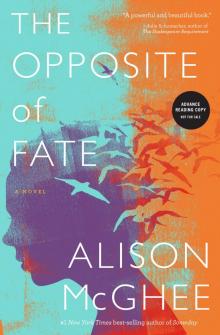 The Opposite of Fate (ARC)
The Opposite of Fate (ARC)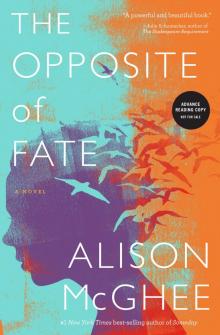 The Opposite of Fate
The Opposite of Fate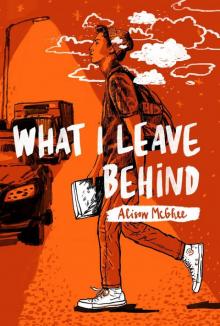 What I Leave Behind
What I Leave Behind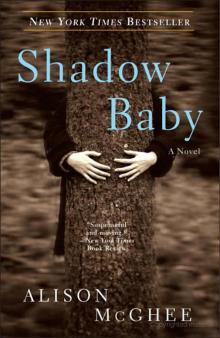 Shadow Baby
Shadow Baby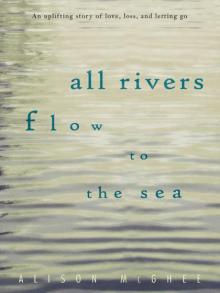 All Rivers Flow to the Sea
All Rivers Flow to the Sea Was It Beautiful?
Was It Beautiful?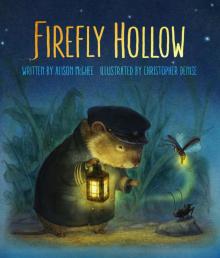 Firefly Hollow
Firefly Hollow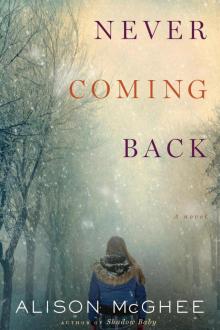 Never Coming Back
Never Coming Back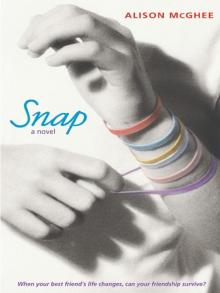 Snap
Snap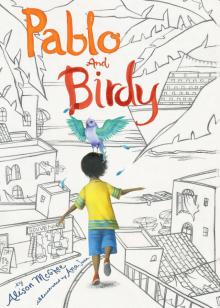 Pablo and Birdy
Pablo and Birdy